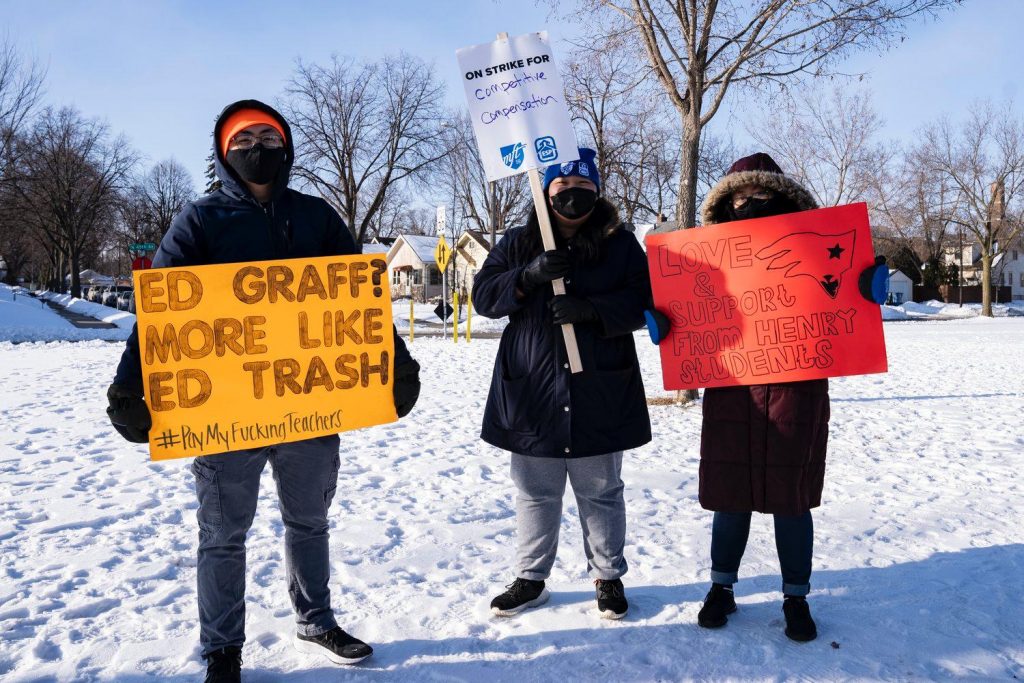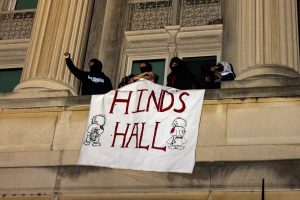Macks Hopland, an Educational Support Professional (ESP) in Minneapolis posted the following account on his Facebook page. Left Voice is republishing it with his permission. Macks takes an important look at how the school district and its officials answer to corporate interests (specifically the Minneapolis Foundation) that have for decades attempted to dismantle public education to lower their taxes. Behind the scenes, Minnesota’s economic policies are shaped by a working team of CEOs and philanthropists who comprise a working group called The Itasca Project. Together, these capitalists wield their influence on elected officials, lawmakers and, yes, school superintendents. The political figureheads, in service of such a state, seek direction from corporate interests and have little interest in the needs of the masses..
The Democratic Party – known as Democratic Farmer Labor Party (DFL) in Minnesota — is completely in service of capital. From former mayor, RT Rybak, who now is the CEO of the Minneapolis Foundation, to current mayor Jacob Frey and Governor Tim Walz, who do nothing to improve the conditions of public schools, the Democratic Party has shown that they are no allies of working people. Seven of the nine elected school board members carry Democratic Party endorsements. While Democrats may pay lip service to labor struggles, they ultimately work with the capitalists and their union-busting firms, not against them.
__________________________________________
I’ve had dozens of conversations with other strikers and supporters over the last couple of weeks on the topic of who on the district’s side has the real power and where that power comes from. Why has the school district dug in its heels to do everything it can to resist union proposals that would plainly make public education better for students and staff? My own thoughts have developed a lot on this subject over the course of these conversations.
There’s many different ways this gets framed, so I want to go through all the ways I think it’s wrong to think about it and end with a more complete analysis.
The simplest framework is to see the Minneapolis Public Schools (MPS) negotiating team (NT) as having real power on the district’s side during negotiations. The NT members are the ones that sit across from the union, that hear and reject proposals, that make their own proposals, and so on. So on the surface, they look like the ones with the power.
However, that’s far too simple. MPS hires HR executives and lawyers to sit on their negotiating team to give MPS as good a deal as it can get, which means, the job of HR and the lawyers is to say no to everything the union asks for. There’s no way to reason with or persuade the district NT because they’re literally just there to say no. Of course, they’re really paid to say no in a way that sounds fancy, that comports (mostly) with the law, and that makes them look like the good guys. But mostly they just say “no”.
When pushed far enough, the MPS NT will frankly admit they don’t have the power to give educators raises or decrease class sizes, because that would require spending above and beyond what the MPS School Board has already officially decided it will spend on the labor contract.
The second pass analysis is to see the school board members as the real power holders, since they are the ones who can raise the dollar amount to be spent on the contract that would be able to fund all of the union’s proposals. While this is true in a sense, when taken at face value it is far too simplistic.
As with most large complex organizations and corporations that have boards of directors and executives (Ed Graff as the superintendent is the equivalent of MPS’s chief executive), it’s mostly the executives that run the show at school districts. Sure, the school board members are the ones that initially hire the top executives, but school board members are only paid a part-time salary, almost none of them have professional experience in managing a large organization, and they are elected usually on the basis of the ties to their community instead of expertise supervising staff teams or analyzing billion dollar budgets. So when school board members are elected, they hire the superintendent to basically do all the actual work of managing the school district. Sure, legally the board has oversight and votes on budgets, but for the most part, the board is not deeply involved enough or in regular contact with all the departments and staff or professionally competent enough to really provide oversight in any real sense.
When school board members do want to go against the grain of the superintendent, they still have to rely almost entirely on budget projections, interpretations, and legal opinions of district staff who work for the superintendent, and all of that information is filtered through the lens the superintendent wants. For that reason, most school board members, even those who disagree with district decisions from time to time, just go along with the superintendent’s program. (The centralization of school district power within the office of the superintendent has a long history, which is documented in Marjorie Murphy’s book Blackboard Unions.) While officially the superintendent will swear up and down that he has no power over contract negotiations and that it’s really the negotiating team in charge, he’s the one within the district that calls the shots and can signal to the board members and the NT how much to concede to union demands or how far to dig in their heels.
So is it the superintendent who is the real power holder for MPS in its negotiations with the educators’ unions? Yes and no. One of the primary tasks of the superintendent is to maintain the financial health of the district, which means spending within its means. So when the NT and board keep saying no to union proposals, it’s because the super is basically trying to keep the district in financial good health. But what does “good health” really mean, and “good” for who? The superintendent isn’t some stand-alone autonomous agent but rather is just another gear, even if a large one, in the larger clockwork. What larger pressures operate on the super that makes him do what he does?
Public education is one of the top expenses in all municipal budgets, and thus is one of the main tax burdens, specifically of property taxes, at the local level. Because taxation and education are by nature redistributive institutions, those with the most wealth in society try to limit their taxes for education as much as possible.
The Minneapolis Foundation is the local group through which most of the major Fortune 500 companies based locally, for example, Target, Cargill, 3M operate their “philanthropy”. While some of its work is charity-based, most of it is the public lobbying arm of the local corporate top brass. It directly and indirectly funds a lot of the local advocacy groups responsible for public education initiatives. While it doesn’t get as much publicity as it should, the Minneapolis Foundation has been involved in nearly every major aspect of public education policy in Minneapolis for a long time. For example, the Minneapolis Foundation funded all the prominent “community” groups that pushed for the Comprehensive District Design (CDD), a school district redesign plan that was deeply unpopular before and after it was implemented at the beginning of this year. They released a major report on how school districts should respond to Covid at the height of the pandemic. They have also been a major force behind the pushing and funding of charter schools that drain public school funds. They maintain a laser focus on optimizing standardized test scores and budget efficiency above all else, and so on. They rebrand their public education policy campaign every couple years, but it currently goes by the name “Reimagine Education.”
All of the materials on the website sound dandy, but it doesn’t take a genius to see beneath the surface and find their agenda. According to its 990 tax filings, Minneapolis Foundation had $200,000,000 in revenue in 2021, making it by far the largest private donor for non-profits in the Twin Cities. On page 51, it shows that the recipient of its 2nd largest single grant, $3.8 million, was to an org called “Great MN Schools” which says its mission is to advocate for high-performing schools for underserved populations, but what it actually does is lobby for charter schools and fund related organizations. One of Great MN Schools’ own grant recipients is the MN Parent Union, (MPU) which is the most aggressive anti-public education, anti-education unions organization in the state (MPU executive director Rashad Turner’s interview on Laura Ingram’s right-wing Fox News show is mild compared to his social media presence, where, for example, his Twitter name was “Teacher unions kill our children’s hopes and dreams”).
The Minneapolis Foundation funds, directly and indirectly, a dozen such organizations locally, all of which may not be as extreme as MPU but which all are in line with its agenda. Other major recipients of the Mpls Foundation are Blake and Breck, two of the wealthiest private schools in Minneapolis, which would seem to belie the foundation’s commitment to equity. These kinds of connections help show what the priorities are of the Minneapolis Foundation and its corporate donors.
While the main target of the Minneapolis Foundation is the school superintendent because he is the one with the most direct control over the school district, the wider network of corporate elite also play an outsized role in school board elections. Political party endorsements, education nonprofits, and favorable press coverage all depend in part on having a number of wealthy donors willing to support and fund school board candidate campaigns. Election campaigns are gauntlets, and those who agree with or are willing to go along with those in the Minneapolis Foundation crowd. have a big leg up and end up filling most seats on the school board locally.
To tie this back to contract negotiations, everything that MFT is asking for is essentially to invest more resources in public education to make schools better for educators and students. But the Minneapolis Foundation doesn’t want to put more resources into public education. As the cream of the local corporate elite, like every corporate lobby group, from American Legislative Exchange Council (ALEC) to the Chamber of Commerce, they want taxes to be lower. This talk on YouTube shows how much of this works at the state level, where the corporate lobby group ALEC plays the same role in influencing policy as the Minneapolis Foundation plays for MPS. Even if the Minneapolis Foundation has little direct control over school district budgets, its network of nonprofits and lobbyists exercises a tremendous amount of influence in keeping education spending down. These corporate lobby groups love to say public schools are inefficient and are based on an outdated model of education, and that what we need to do is modernize everything to make them more “efficient”. Small class sizes aren’t “efficient”, mental health resources aren’t “efficient”, living wages aren’t “efficient”. Efficiency is just a buzzword that really means schools should do everything on the cheap. Every public educator recognizes this in how we’ve seen schools get fewer resources and are expected to do more.
Again, with regard to contract negotiations, Ed Graff has essentially done most of what the Minneapolis Foundation and related groups have asked of him: from the CDD, to the Covid-19 policy, and now fighting the unions tooth and nail. If there’s anything Fortune 500 companies hate, it’s unions. When unions aren’t cutting into corporate profits directly by forcing them to pay their own workers more, public sector unions are cutting into corporate profits by forcing the wealthy to pay higher taxes that pay for public goods like education. The Target Corporation is one of the largest MN-based corporations that’s closely tied to the Minneapolis Foundation, and Target is infamous for its aggressive anti-union policies.
So who then has the power in MPS on the district side? The district negotiating team spends what the school board gives them, the school board takes cues on budgets and large-scale policies from the superintendent, and the superintendent is being constantly lobbied by and is constantly trying to please the network of nonprofits and lobbyists connected to the Minneapolis Foundation, which is the local representative of top corporate interests. It’s those in and around the Minneapolis Foundation that have the real power that’s behind MPS’ rigid opposition to the union demands. But of course the Minneapolis Foundation isn’t the one sitting across the table from the union, but rather, its influence is filtered down through the superintendent, through the school board, and to the MPS negotiating team.
Thus, these four levels fill out a more complete analysis and operate essentially as a larger “MPS unit”. Sure, a few school members might deviate from the plan, but Ed Graff has always had the majority of board members in his pocket. This structure has been the dominant one going back to previous superintendents as well. The point is that the particular individuals who hold political or executive office determine school district policy much less than the larger economic and political structures that bear down on them.
Sometimes when this anti-corporate criticism is made it can seem vague or conspiratorial, but when this criticism is made including the direct financial relationships and political connections, I think it can show what people’s interests really are in contrast to their rhetoric. It shouldn’t be surprising that the Minneapolis Foundation has different interests than working educators and public education students, and we should expect to find these clashes of interests at their most intense in fights over issues like school funding at stake in the Minneapolis educator strike.
Thus, if we are to truly challenge the power of the district in this strike, we need to put pressure on all levels of this MPS unit. How do we do that? It starts with education workers and communities coming together to act in their own interests, to strike for what’s best for the 29,000 students and 4,000 staff instead of what’s best for a few wealthy people and their political agents. When enough costs can be imposed on the MPS unit, then it will be less costly to concede than to continue fighting the union demands. When we put enough pressure on the Minneapolis Foundation network, on the super, on the board, on the negotiating team, then it will be in their self-interest to give us what we want. Of course, precise questions of strategy and tactics are necessary to draw this out in its full details, which is a whole other story. As striking educators, knowing who holds the power on the district side of contract negotiations, knowing who our enemy is, is essential for understanding and winning the fight.
Macks Hopland is an Educational Support Professional (ESP) in Minneapolis.










